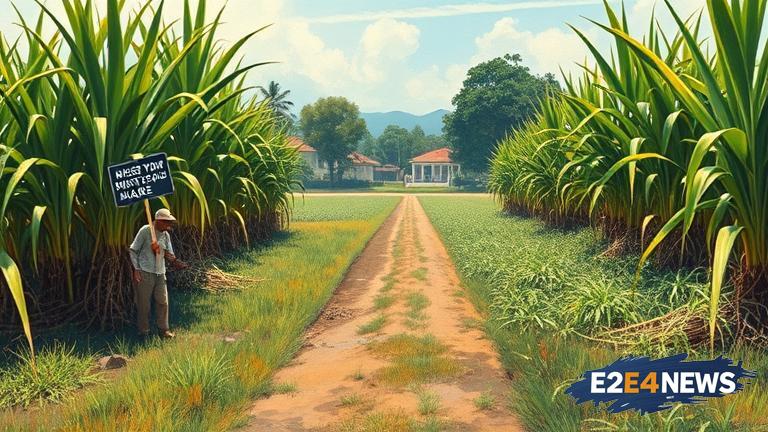Sugarcane farmers in Kenya’s prime cane-growing region are up in arms over a proposed residential development that threatens to encroach on their land. The farmers, who have been cultivating sugarcane in the area for generations, are concerned that the development will not only affect their livelihoods but also have a negative impact on the environment. The proposed development, which is slated to include residential homes, commercial centers, and other infrastructure, is expected to cover a significant portion of the cane-growing zone. The farmers argue that the development will lead to the destruction of their crops, loss of income, and displacement of their families. They also point out that the area is not suitable for residential development due to the high risk of flooding and soil erosion. Furthermore, the farmers are concerned that the development will contaminate the water sources and soil, making it difficult for them to continue farming. The farmers have been engaging with the local authorities and other stakeholders to express their opposition to the development. They have also been seeking support from other farmers and community members to join their cause. The issue has sparked a heated debate in the region, with some arguing that the development is necessary for economic growth and others arguing that it will have devastating consequences for the environment and the farmers. The local authorities have been urged to reconsider the proposal and explore alternative locations for the development. The farmers have also threatened to take legal action if their concerns are not addressed. The controversy has highlighted the need for sustainable development that balances economic growth with environmental protection and social responsibility. The sugarcane industry is a significant contributor to Kenya’s economy, and the farmers play a crucial role in the production of sugarcane. The industry provides employment opportunities for thousands of people and generates revenue for the government. However, the industry is facing numerous challenges, including climate change, pests, and diseases, which have affected sugarcane production in recent years. The proposed development is expected to exacerbate these challenges and further threaten the livelihoods of the farmers. The farmers are calling on the government to provide support and protection for the sugarcane industry, including measures to mitigate the impact of climate change and other challenges. They are also seeking assistance to improve their farming practices and increase their productivity. The controversy has sparked a wider debate about the need for sustainable development and the importance of protecting the environment and the rights of farmers. The issue has also highlighted the need for effective governance and regulation to ensure that development projects are carried out in a responsible and sustainable manner. The farmers are determined to continue their fight against the proposed development and are seeking support from all stakeholders to protect their livelihoods and the environment. The outcome of the controversy is still uncertain, but one thing is clear: the sugarcane farmers will not give up their fight to protect their land and their way of life. The proposed development has also raised concerns about the impact on the local ecosystem and the potential loss of biodiversity. The area is home to a variety of wildlife, including birds, insects, and small mammals, which could be displaced or harmed by the development. The farmers are also concerned about the potential impact on the water sources, including rivers and streams, which could be contaminated by the development. The controversy has sparked a wider discussion about the need for environmental protection and the importance of preserving natural habitats. The sugarcane farmers are not alone in their fight, as other farmers and community members are also opposing the development. The issue has brought the community together, and there is a growing sense of solidarity and determination to protect the land and the environment.





